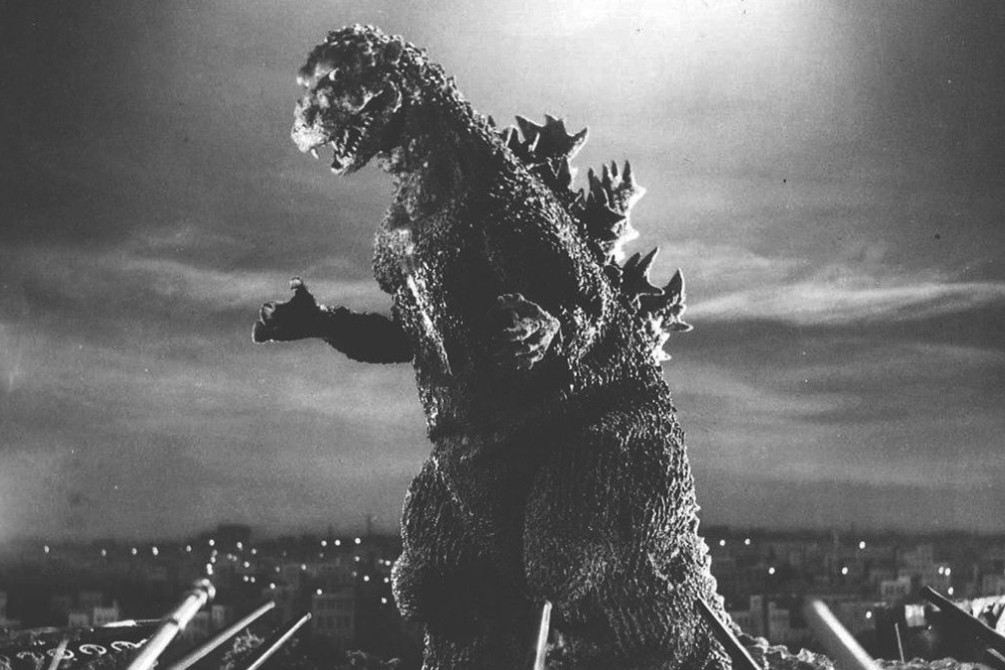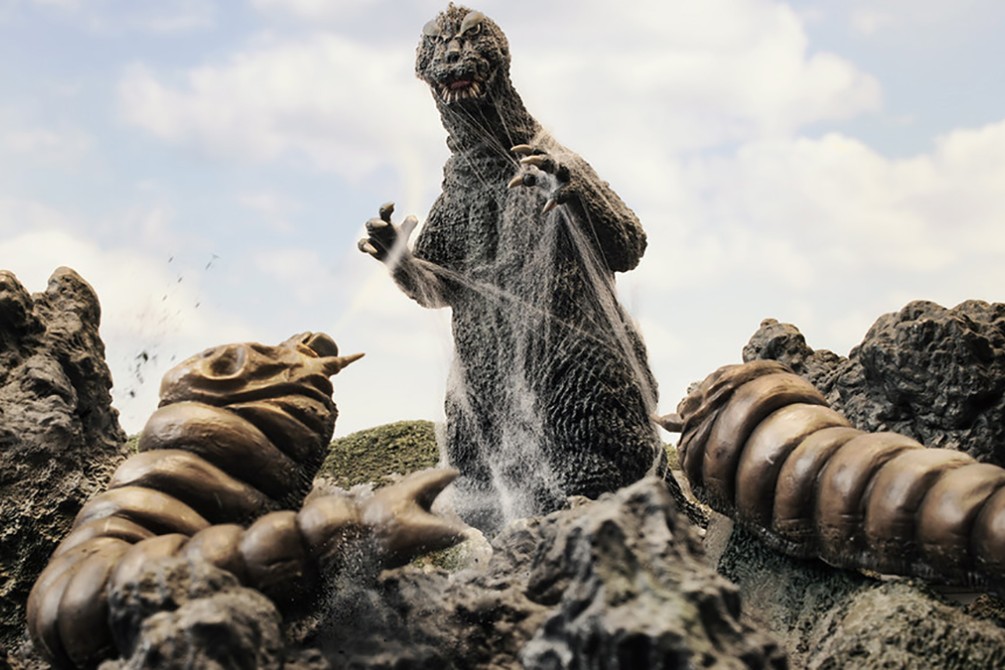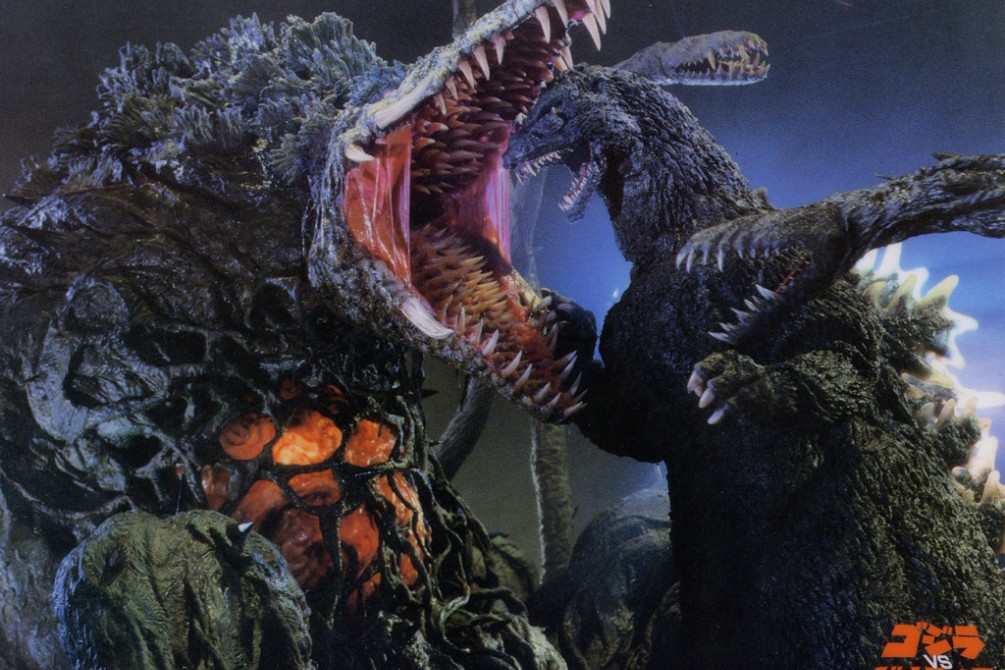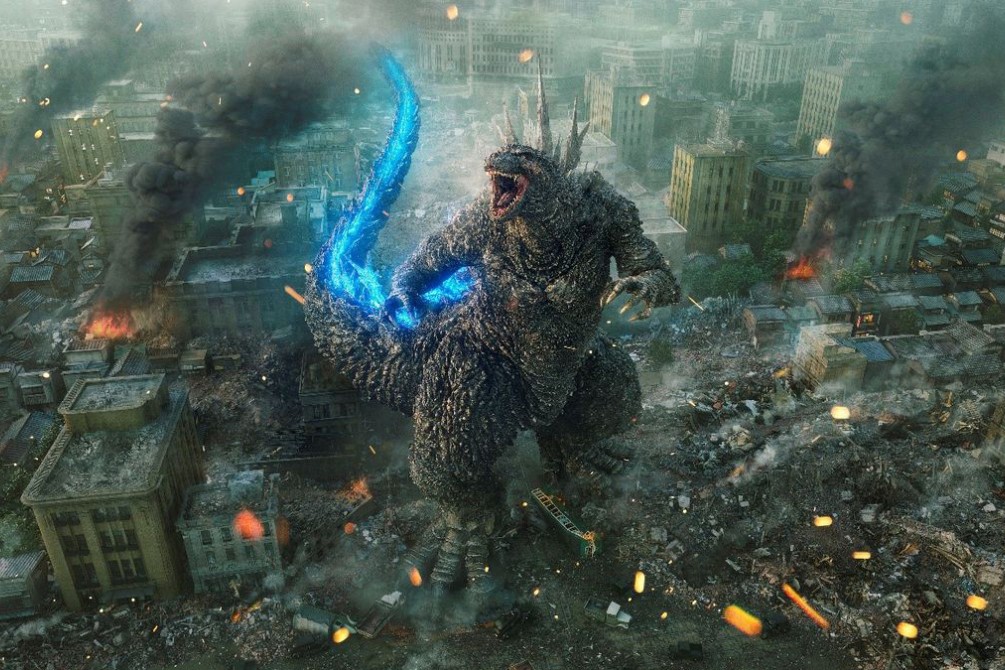At those rare times I’m honest with myself, I accept that the longest, least fraught relationship I’ve had in my entire life is with a 70-year-old Japanese man. To be more specific, I don’t actually know if Godzilla is a man. Audiences have never been shown his monster genitalia, but most American takes on Godzilla usually gender him as male. The Japanese, his birthparents, just go with “It.”
Either way, Godzilla’s been an ideal companion.
However hard it’s been to explain that love. Some people just don’t get Godzilla.
But starting June 7, the Music Box Theatre in Lakeview is making an elaborate, affectionate case for the big guy that generations of G-Fans never thought possible. They call it “Godzilla vs. Music Box,” and, well, I have never felt more seen.
For one week, the esteemed art house will screen 24 of Godzilla’s 35 live-action movies, some Japanese, some American, all made since the atomic giant ate his first train 70 years ago. The centerpiece is a 24-hour marathon of Showa-era Godzilla — aka G-fandom’s shorthand for the classics, the 15 films made in Japan between 1954 and 1975, from the grim Hiroshima/Nagasaki allegory of the original “Godzilla” to later costumed, candy-colored, giant-monster smackdowns, culminating in the inspired lunacy of “Terror of Mechagodzilla.” In that film, a marine biologist falls in love with a mad scientist’s daughter, who is really a cyborg controlling Mechagodzilla, a robot built by space aliens, who themselves control a dinosaur with an orange mohawk and unleash both monsters, only to be beaten by Godzilla, with an assist from Interpol.
Who couldn’t fall in love with that?
The weird malleability of a 400-foot-tall monster has meant sometimes Godzilla is a radioactive Ed Asner, a lumbering grump, four horsemen of the apocalypse rolled into one cold-blooded lizard, and sometimes a defender of Earth. Sometimes both at once: “Godzilla Minus One,” last winter’s touching Japanese import, now the highest-grossing Japanese-language film in United States history and the first Godzilla movie to win an Academy Award (for best special effects), delivered an old-school nihilistic vision of the post-World War II doomstroller. Only months later, the Hollywood-made “Godzilla x Kong: The New Empire,” itself a blockbuster, offered us that softer Godzilla — so exhausted he sleeps away his days curled into the Colosseum in Rome.
“Godzilla vs. Music Box” starts smartly with the historical Godzilla, the bad Godzilla. On Friday, there’s a double feature of “Godzilla Minus One” and 2016’s underrated “Shin Godzilla,” with an intermission panel discussion on Godzilla as an “atomic age anti-hero,” featuring local experts on Japanese culture and professor Yuki Miyamoto of DePaul University, whose work focuses on nuclear discourse and environmental ethics.
The birthday party continues Saturday with the marathon (as of this writing, it’s two-thirds sold out); a Sunday night screening of that iffy 1998 “Godzilla” by Roland Emmerich, followed by its Japanese response, “Godzilla 2000”; weeknight showings of a couple of Japanese-made Godzilla films from the ‘90s; a Field Museum entomologist presenting insects and a showing of “Mothra vs. Godzilla”; a screening of the matinee classic “Destroy All Monsters,” presented by TV legend Svengoolie; Godzilla comic book artists; Godzilla tattoo artists; Godzilla historians; Japanese toy vendors, Japanese snacks. If that’s not enough, the Chicago-based Japanese Arts Foundation, which helped organize this party, will continue festivities into the fall, with more G-events. (It’s not related to the Music Box festival, but G-Fest, the international Godzilla convention thrown annually in Rosemont, has its own 30th anniversary next month, July 12-14; more at www.g-festcon.com.)
“Godzilla fans are eating so well right now,” said Kyle Cubr, senior operations manager at the Music Box, who has been pushing for a Godzilla blow-out for years. He tracked down clean copies of the originals. He contacted one of the monster-suit actors for advice on prying prints out of Toho, Godzilla’s Japanese creator. He sought a rare copy of “Rodan” only to learn Quentin Tarantino has the best print and doesn’t part with it. Not until the past year, when Godzilla became G-Money again, have stars aligned. The 70th anniversary arrives in the wake of “Godzilla Minus One,” the ongoing popularity of the new American series from Legendary Entertainment and Warner Bros. and the success of the Apple TV+ Godzilla streamer with Kurt Russell, “Monarch: Legacy of Monsters.”
“Godzilla has never been bigger,” Cubr said.
In fact, he’s so big 70 years after his birth that Toho and Legendary now have a reported agreement that Toho can’t release a Godzilla film the same year Legendary releases one; that’s why, despite the success of “Godzilla Minus One,” it vanished from theaters soon after New Year’s Day and arrived on video more than six months after its release. So that Music Box screening — “we received a special exemption,” Cubr explained — is rare right now.
All of which, to this G-Fan of Gen-X vintage, rings bittersweet.
Godzilla toys! Godzilla historians! To be a Godzilla fan decades ago meant an occasional movie still in the Famous Monsters of Filmland magazine, a goofy Saturday morning cartoon, few toys and a short-lived Marvel comic. I was so starved for Godzilla, I went late to Jimmy Bricker’s birthday party because “Godzilla Vs. Megalon” was on “Creature Double Feature” and I had not seen it. I’m sure I gave him a better excuse.
These days Godzilla is such a familiar, occasionally poignant import that Saira Chambers, executive director of the Japanese Arts Foundation and director of the Japanese Culture Center, decided Godzilla would be the theme of the year for those Chicago organizations. In November, they’re throwing a Godzilla-themed gala. In March, they launched the Godzilla Association for Women, Thems and Non-Femmes. Chambers’ background is in nuclear non-proliferation work, including a stint at the Hiroshima Peace Memorial Museum. She loves that Godzilla has become a modern Trojan horse for concepts of peace and nuclear power. To that, I would add thoughts on handcrafted filmmaking, Japanese aesthetics, species conservation and disaster preparedness. Godzilla, after 70 years, almost seems respectable. “He embodies ideas we can’t always wrap our heads around,” Chambers said. “But the main thing is that, for whatever reason you hold onto, he’s still capturing lots of hearts. Godzilla’s still around.”
“Godzilla vs. Music Box” runs June 7-13 at the Music Box Theatre, 3733 N. Southport Ave.; www.musicboxtheatre.com
cborrelli@chicagotribune.com






